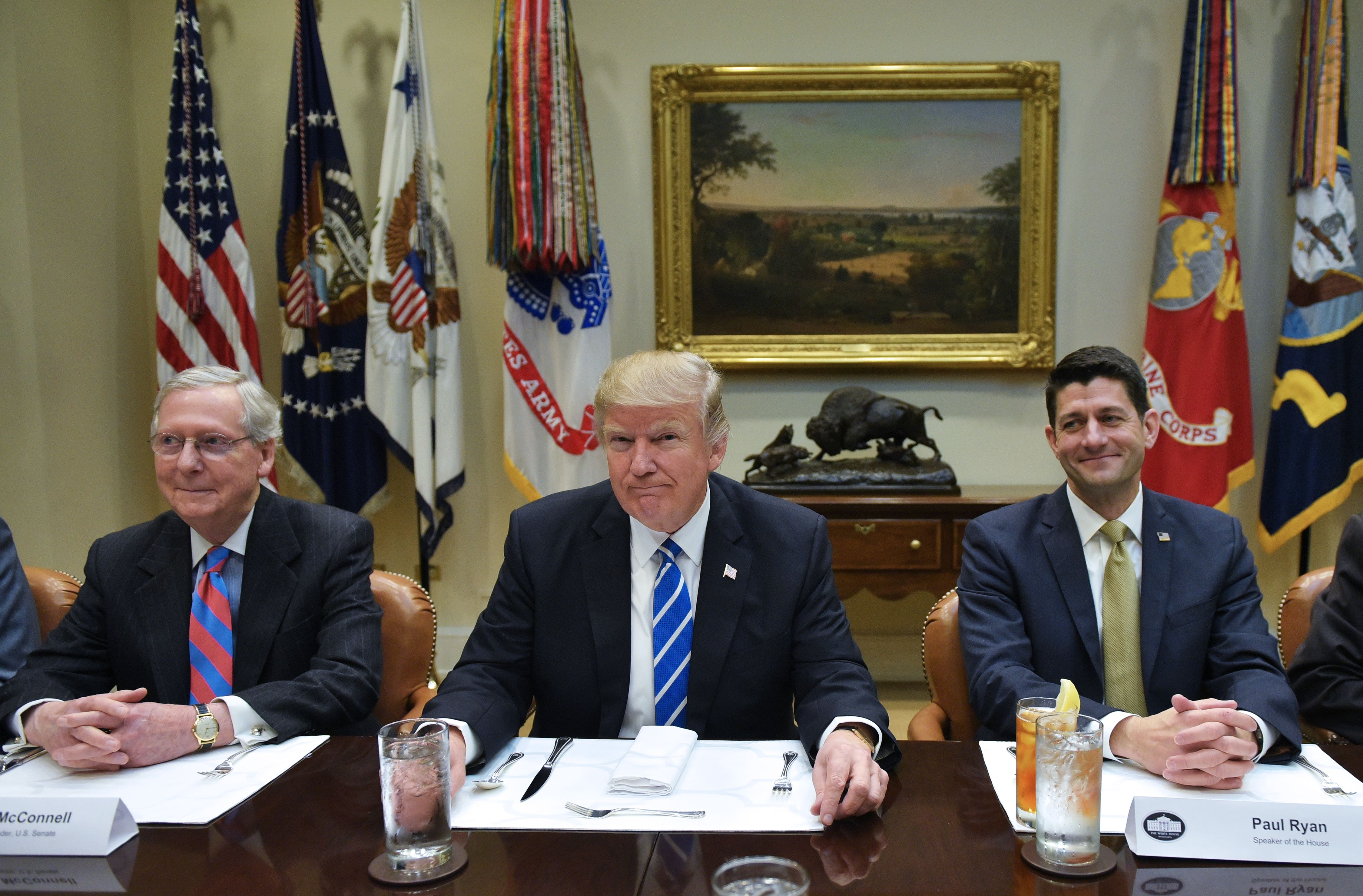President Trump won the election by rejecting GOP orthodoxy. Now he's embracing it.
Too bad, Trump voters


Donald Trump had many advantages in the presidential election, from the divided field to the incompetence of his primary and general election opponents. But unquestionably his greatest positive advantage was how he ditched traditional Republican notions on social programs.
Republicans have traditionally said that Social Security, Medicare, and Medicaid need to be cut, citing a supposed national debt crisis. This was a tough line to sell — first because that argument is duplicitous claptrap, but more importantly, because all those programs are quite popular, particularly among enrollees.
Trump ditched all that nonsense, loudly promising no cuts to those programs and something better than ObamaCare to provide coverage to everyone. And those lines helped him seize the presidency. But now that it's time to actually make policy, all the usual libertarian poison is flooding back in. As president, he's ditching his biggest political advantage.
The Week
Escape your echo chamber. Get the facts behind the news, plus analysis from multiple perspectives.

Sign up for The Week's Free Newsletters
From our morning news briefing to a weekly Good News Newsletter, get the best of The Week delivered directly to your inbox.
From our morning news briefing to a weekly Good News Newsletter, get the best of The Week delivered directly to your inbox.
For decades, the most conservative Republicans — backed by a complex of libertarian think tanks, business pressure groups, and academic economic departments, all funded by the ultra-rich — have pushed an austere libertarian economic line saying essentially that the government should return to its pre-New Deal footing and basically get out of the business of providing insurance to people. That means many, if not most, people who can't afford lifesaving care should be allowed to die.
Since that is an impossibly brutal and unpopular thing for most people to argue, conservatives have taken two general argumentative tacks. First, don't push plans that fulfill the logic of the real motivation (that taxing rich people to provide care for others is immoral), but instead just go towards it by only partially scrapping social insurance plans. Second, insist over and over that when you, say, kick 15 million people off their insurance, the magic free-market fairy will step in and they'll be able to get good private coverage under some Republican plan. To quote the very first sentence of Paul Ryan's health-care document: "In a confident America, everyone has access to quality, affordable health care."
Now we're getting a good look at the House Republican plan to replace ObamaCare, and the mask is coming off. The American Health Care Act (call it TrumpCare) would first cut taxes by $600 billion over 10 years, virtually all of the benefit going to the rich. It would keep the basic structure of the ObamaCare exchanges, while making the subsidies dramatically less generous for the poor and working class and somewhat more generous for the middle class. The individual mandate would go, to be replaced by a complicated premium rate penalty for being uninsured. There are a variety of smaller provisions, too.
More importantly, TrumpCare would start a slow process of whittling Medicaid down to a stump, as my colleague Jeff Spross explains. First they would strangle the program's expansion under ObamaCare, by making it impossible to re-enroll if you lose eligibility (which happens constantly) under the new criteria. Then they would change it from a defined-benefit program — where funding is mandatory for whatever the benefits cost — to a defined-contribution one, where states just get a lump sum. Then they would ratchet federal contributions down year by year, shifting costs to states, most of whom will almost certainly just slash funding and enrollment.
A free daily email with the biggest news stories of the day – and the best features from TheWeek.com
There is basically zero provision for people who lose coverage. Brookings estimates that at least 15 million people will lose coverage from the repeal of the mandate, and almost certainly millions more from the Medicaid changes, which will only get worse and worse over time. The New York Times estimates that the people worst-hit — generally in rural and low-income states — voted heavily for Trump. It's a brutally cruel policy — but it's basically what must happen if cutting taxes for rich people is the sine qua non of policymaking. (Tellingly, the crew at Heritage Action and the Cato Institute are furious it's not conservative enough.)
Some conservative politicians seem to have genuinely duped themselves about the laudatory effects of goring social insurance, while others were almost certainly lying through their teeth — witness Paul Ryan get extremely worked up about the very idea of healthy people subsidizing the sick ones in an insurance pool, for example. It's anybody's guess in which camp Trump belongs. Given that he has no secretary of agriculture, possibly because nobody in the White House has bothered to formally submit his nomination to the Senate, I would lean toward the former explanation.
But in practical terms, it doesn't matter. By supporting this bill, Trump has betrayed his promise not to take away people's coverage and thrown away his greatest political strength — all so that rich people like himself and the people in his Cabinet can enjoy a gigantic tax cut.
Ryan Cooper is a national correspondent at TheWeek.com. His work has appeared in the Washington Monthly, The New Republic, and the Washington Post.
-
 Striking homes with indoor pools
Striking homes with indoor poolsFeature Featuring a Queen Anne mansion near Chicago and mid-century modern masterpiece in Washington
-
 Why are federal and local authorities feuding over investigating ICE?
Why are federal and local authorities feuding over investigating ICE?TODAY’S BIG QUESTION Minneapolis has become ground zero for a growing battle over jurisdictional authority
-
 ‘Even those in the United States legally are targets’
‘Even those in the United States legally are targets’Instant Opinion Opinion, comment and editorials of the day
-
 The billionaires’ wealth tax: a catastrophe for California?
The billionaires’ wealth tax: a catastrophe for California?Talking Point Peter Thiel and Larry Page preparing to change state residency
-
 Bari Weiss’ ‘60 Minutes’ scandal is about more than one report
Bari Weiss’ ‘60 Minutes’ scandal is about more than one reportIN THE SPOTLIGHT By blocking an approved segment on a controversial prison holding US deportees in El Salvador, the editor-in-chief of CBS News has become the main story
-
 Has Zohran Mamdani shown the Democrats how to win again?
Has Zohran Mamdani shown the Democrats how to win again?Today’s Big Question New York City mayoral election touted as victory for left-wing populists but moderate centrist wins elsewhere present more complex path for Democratic Party
-
 Millions turn out for anti-Trump ‘No Kings’ rallies
Millions turn out for anti-Trump ‘No Kings’ ralliesSpeed Read An estimated 7 million people participated, 2 million more than at the first ‘No Kings’ protest in June
-
 Ghislaine Maxwell: angling for a Trump pardon
Ghislaine Maxwell: angling for a Trump pardonTalking Point Convicted sex trafficker's testimony could shed new light on president's links to Jeffrey Epstein
-
 The last words and final moments of 40 presidents
The last words and final moments of 40 presidentsThe Explainer Some are eloquent quotes worthy of the holders of the highest office in the nation, and others... aren't
-
 The JFK files: the truth at last?
The JFK files: the truth at last?In The Spotlight More than 64,000 previously classified documents relating the 1963 assassination of John F. Kennedy have been released by the Trump administration
-
 'Seriously, not literally': how should the world take Donald Trump?
'Seriously, not literally': how should the world take Donald Trump?Today's big question White House rhetoric and reality look likely to become increasingly blurred
